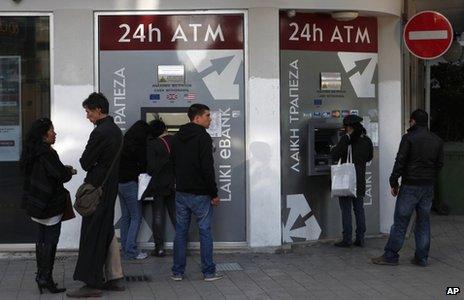Cyprus rescue breaks all the rules
- Published
- comments

Reform of how to mend broken banks, which has been negotiated globally and in Europe since the Crash of 2007-8, has been based on two central principles.
First, that the savings of ordinary people should be protected, up to a high threshold - or 100,000 euros in the European Union for example.
And that financial institutions which lend to banks by buying their bonds should incur losses when banks are bailed out: bondholders should, to use the jargon, be bailed in, as part of resolution plans.
The logic behind these tenets is simple: financial institutions ought to be sophisticated enough and informed enough to assess the risks of lending to a bank, and therefore deserve to be punished when their judgement is awry; most of the rest of us can't possibly know if our high street banks are making reckless gambles.
The hope is that the kind of big investors which buy bonds would put pressure on banks to stick to the straight and narrow. And that retail savers are so confident that their money is safe that they never feel the urge to behave like the customers of Northern Rock in September 2007 by descending in a mob on branches and withdrawing every last cent.
So what is seen by many as profoundly shocking about the terms of the rescue of Cyprus by the rest of the eurozone and the International Monetary Fund is that both of these principles have been broken.
Retail savers are being punished, by a levy of 6.75% on savings up to 100,000 euros.
And bondholders aren't being touched.
How did this happen? Well as I mentioned on Saturday the German government was determined that the Cypriot rescue should not be seen by German taxpayers as in effect rescuing Russian money launderers with deposits in Cyprus.
But a deal that might just be approved by the German parliament has resulted in serious collateral damage to the credibility of policymakers in the eurozone and the IMF.
The Cypriot deal sets back the cause of the new global rules for bringing order to banking systems when crisis hits. Apart from anything else, in other eurozone countries where banks are weak, it licenses runs on those banks, as and when a bailout looms.